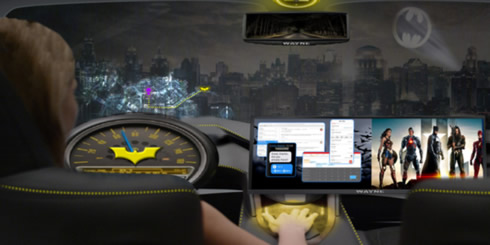Advancing what's possible in autonomous driving, today at the Los Angeles Auto Show, Intel announced a collaboration with Warner Bros. to develop in-cabin, immersive experiences in autonomous vehicle (AV) settings.
Called the AV Entertainment Experience, Intel is creating a proof-of-concept car to demonstrate what entertainment in the vehicle could look like in the future.
As passengers shift from being drivers to riders, their connected-device time, including video-viewing time, will increase.
With this expansion of available time, Warner Bros. and Intel imagine significant possibilities inside the AV space.

"Not only do we see passengers consuming content ranging from movies and television programming, we imagine riders enjoying immersive experiences never seen before, courtesy of in-cabin virtual reality (VR) and augmented reality (AR) innovations. For example, a fan of the superhero Batman could enjoy riding in the Batmobile through the streets of Gotham City, while AR capabilities render the car a literal lens to the outside world, enabling passengers to view advertising and other discovery experiences," said Brian Krzanich, chief executive officer of Intel Corporation.
Krzanich says that its Mobileye ADAS (advanced driver assistance system) technology on the road today is already saving lives. "Current ADAS products from Mobileye have proven to reduce accidents by 30 percent, saved 1,400 lives, prevented 450,000 crashes and saved $10 billion in economic losses. However, we cannot stop there. Our long-term goal has to be zero driving-related fatalities," he added.
To reach this goal, Krzanich said that new standards and solutions are need to enable mass production and adoption of autonomous vehicles.
To this end, Intel is collaborating with the industry and policymakers on how safety performance is measured and interpreted for autonomous cars. Krzanich says that setting clear rules for fault in advance will bolster public confidence and clarify liability risks for consumers and the automotive and insurance industries. Already, Intel and Mobileye have proposed a formal mathematical model called Responsibility-Sensitive Safety (RSS) to ensure, from a planning and decision-making perspective, the autonomous vehicle system will not issue a command leading to an accident.